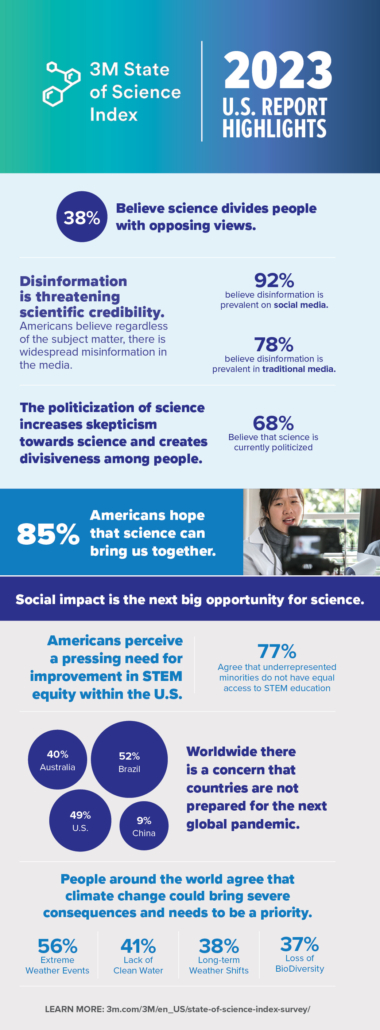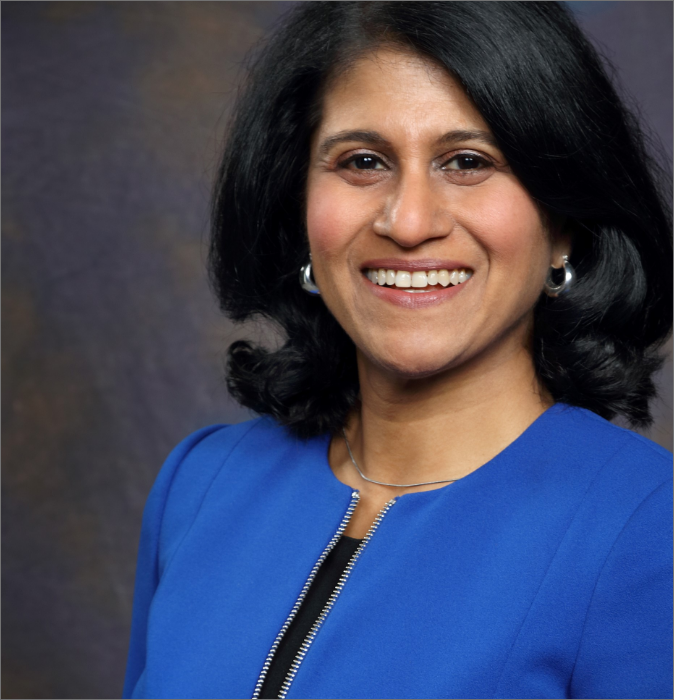You’re an incredibly busy advocate for science and improving diversity across all scientific disciplines. What are some of the things you’re working on that’s got you most excited?
We have recently released the fifth annual State of Science Index. The 2022 Index survey took place in 17 countries, and I am pleased to share that global trust in science has continued to build, and critically, younger generations recognize the essential role science must play in addressing the most important global challenges.
We’ve seen some amazing coverage in the news about the Index. Tell us more about some of your outreach efforts.
As 3M’s Chief Science Advocate, I have the opportunity to participate in events and forums, as well as speak at conferences and educational institutions about how to not only bring more women and minorities into the STEM field — but also how to make sure they excel once they get here.
3M’s State of Science Index shows younger generations particularly recognize the essential role science will play in addressing the biggest global challenges.
– Jayshree Seth, 3M
The State of Science Index results show that the public strongly agrees on the importance of diversity in STEM. They want more to be done to remove the obstacles preventing women and girls entering STEM fields, and they want more diverse role models for young people of all backgrounds to look up to.
Films like Not the Science Type show that we can all be the science type — regardless of gender, race, age or ethnicity. I was honored to be one of the women featured in the docuseries alongside young scientist and inventor Gitanjali Rao; Dr. Jessica Taaffe, a health and science consultant; and Dr. Ciara Sivels, a nuclear engineer. With this film, 3M wants to show that whoever you are and whatever your background, you can blaze trails in STEM and make a real difference in the world.
I am also very excited about the scholarship for underrepresented minority women in STEM, administered by the Society of Women Engineers (SWE), through the sales proceeds from my books, The Heart of Science: Engineering Footprints, Fingerprints, & Imprints published in 2020 and Engineering Fine Print published in 2021.

Broadening STEM education access is critical to improving diversity in science, but it also supports the advancement of trust in science as the key to addressing global challenges. Let’s hear more about the State of Science Index and how it can shape our discussions.
Thankfully, trust in science remains high as we emerge from the pandemic. The 2023 State of Science Index results showed that, with the onset of the pandemic in 2020, skepticism of science went down and stayed low during 2021. Hope was the defining sentiment around science.
3M’s results indicate that science and scientists still garner trust, but rising misinformation threatens to undermine it.
We also found that, beyond the pandemic, the world wants science to prioritize solving the effects of climate change, improving clean water supply and sanitation, helping air quality, and providing equal access to quality healthcare. The public recognizes the critical threat that misinformation poses to each of these goals.
We need science to provide us solutions to these issues. That means we also need scientists. Since there is no easy way to solve the world’s most pressing challenges, it is more important than ever to keep the pipeline of future scientists robust.
But across the globe, the 2023 data shows that the public believes barriers to a strong STEM education are increasing.
We are bombarded with so much information these days. Deciphering fact from fiction can often be challenging for anyone. How are we as a society affected by this and what can be done to correct misinformation?
Our research shows trend lines over time as to how much people trust, respect and value science and the role it plays in our lives. It also helps to understand the public’s concerns.
This year’s State of Science Index results also show that people around the world also recognize that there is widespread misinformation and disinformation on social media (92%) and traditional media (78%), regardless of subject matter. They also believe there will be consequences if we cannot trust news stories about science.
The nascent realities of the infodemic wreaked havoc during the pandemic. Misinformation and disinformation undermined trust in institutions and hampered the response to Covid-19 all over the world. It also showed that, when it comes to disinformation, demographics matter. For younger, tech-savvy generations, science is personal. It is part of their day-to-day lives, but there remains a need to educate them on how to engage with and spread information wisely.
At the other end of the spectrum, older adults are newcomers to the internet. Click-bait headlines and online hoaxes are new to them, leaving them vulnerable. Their relative inexperience with social media can make it difficult to identify real news, sponsored content or even manipulated images.
When responding to misinformation, science communication that typically relies on what is referred to as an information deficit model, does not yield desired results.
– Jayshree Seth, 3M
The gap between what science shows and what people choose to believe, sociologists say, is often about our identity. Science communication that typically relies on what is referred to as an information deficit model when responding to misinformation may not yield the desired results.
The information deficit model assumes that explanation of the facts will rectify false beliefs and overcome misinformation. But communicating the facts, data and evidence alone does not necessarily sway people. Experts believe that the information deficit model ignores the cognitive, social and affective drivers of attitude formation and truth judgements. These factors include not just political, religious, cultural beliefs but also moral value judgements and lived experiences.
Misinformation threatens to prevent science from reaching its full potential — it is imperative that we address it. But there is no silver bullet to such a complicated issue.
That’s why 3M is partnering with the Online News Association (ONA), the world’s largest digital journalism association. 3M and ONA will collaborate on toolkits, training and recognition that will inspire and support journalists as they connect with their audiences about science and misinformation.
The world is at an inflection point. The pandemic has positively impacted appreciation and trust in science. But 3M’s data reveals that misinformation, if unchecked, threatens that trust. It is essential to our everyday lives to be informed. If we want a sustainable and equitable society, being informed is critical for our future, too.
